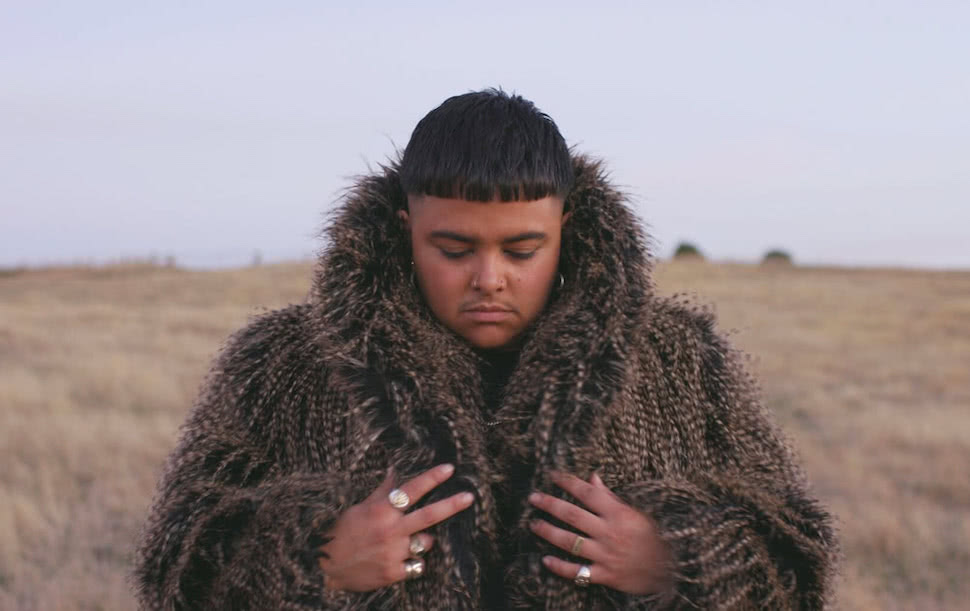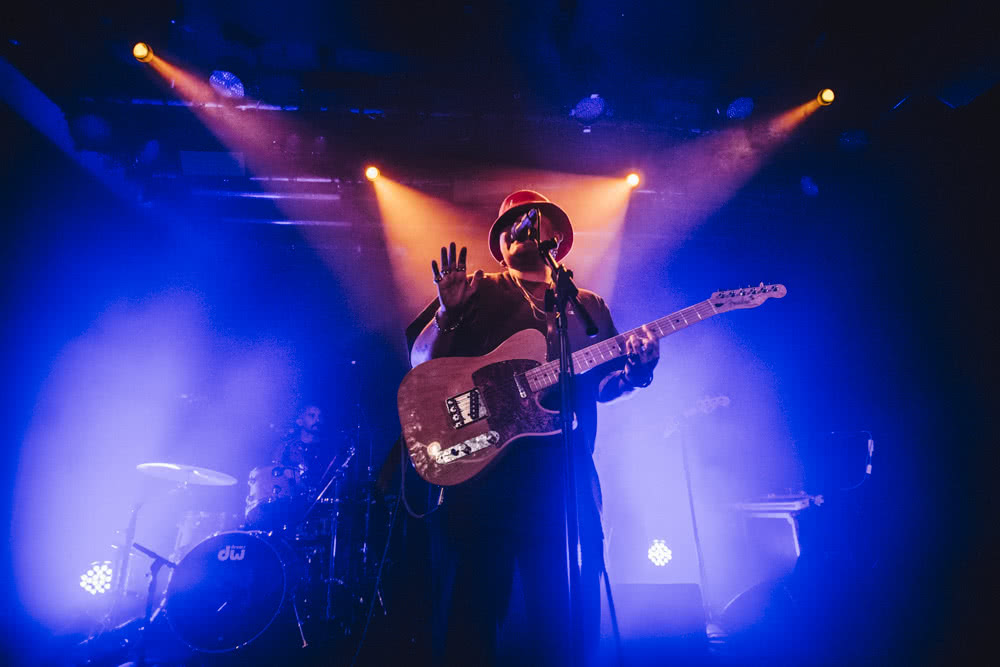6 things we learned about Mojo Juju from her excellent BIGSOUND keynote

Tears, applause at home truths, and a standing ovation were just a few of the reactions to Mojo Juju’s keynote today at BIGSOUND.
Mojo Juju Ruiz de Luzuriaga took the stage at the Brisbane music industry conference and festival for a keynote that would dive into her story.
From her birth in Dubbo, to her beginnings in Lithgow listening to her father Mario speak Spanish as a four-year-old, to why she released triple-ARIA nominated album Native Tongue, and the racism and bullying she is subjected to even now as an adult, we may only be nearing the end of Day 2 at BIGSOUND, but we have a feeling Mojo Juju will be a clear highlight.
Here’s what we learned from Mojo Juju’s keynote at BIGSOUND:
The bullying Mojo Juju was subjected to as a kid was mirrored in all she saw growing up
“I hit puberty at the same time as Pauline Hanson became a household name. I came of age under the government of John Howard. And I went to school in a town where I was the only kid who listened to Michael Jackson and boys to men.
“My differences were greater than being an R&B kid in a field full of Cold Chisel fans […] my earliest recollection of being aware of my differences is of being a five-year-old on a playground. Children [were] taunting me with the sing-song cries of ‘ching chong China man’. Yep, it was the late ’80s in Australia and a lot of people were operating under the misconception that all Asian people were Chinese.”
Her 2015 LP Seeing Red/Feeling Blue “landed short” because she was tired of fighting
“I was feeling defeated and hopeless. The album was a huge departure from the one prior and it did okay, not great. I’d set out to do something adventurous and bold, which is the aim every time I make a record. But it landed short and I knew it.
“[…] I think as a whole album it felt confused, maybe a little bit inauthentic but there were many reasons… One of those reasons was that I was exhausted. I was exhausted of being overlooked and undermined.
“I was exhausted of being billed on world music stages while my friends, collaborators and contemporaries were being billed on more prominent stages. I was exhausted of fighting with male producers and band mates who second-guessed all of my creative instincts and tried to overrule every decision I made.
“[…] I was a full time musician living off my art, that’s the dream right? But still, I never felt quite right. I had a label, agents, incredible people on my team, the fans were there, but I felt like I had to push twice, maybe three times as hard to half as much recognition from certain aspects of the industry.”
A magazine journalist once told her she was “confronting”
“One day, during a magazine interview, the editor of the magazine said to me off the record: ‘You know, I like what you do but I’m very surprised you’ve been so successful’.
“I asked him what he meant, and he told me very matter-of-factly: ‘Well, you’re a queer woman of colour and that’s very confronting’.
“He explains to me that it was incredibly hard to market someone like me to the Australian public because who I am and how I look was too challenging for the general population. On some level I knew all of this but I’d never heard someone say it so plainly.
“A subtext of what he was saying, I guess, was: You can be a woman, sometimes you can be a woman of colour, sometimes you can be a queer woman, but you can’t be a queer, masculine woman of colour. That’s just asking too much.”
Mojo Juju thought Native Tongue would be her swan song
“I swore that I was done. I’d had enough of this industry, on a good day I believed the music industry was rigged against me, that the doors were closed by gatekeepers who were narrow-minded. On a bad day, I believed I was a terrible musician, an awful songwriter, couldn’t sing and I’d deluded myself by thinking I could ever have a career.
But I still owed my record label one album. So eventually, when I finished feeling sorry for myself I made a decision. I was going to make an album. One that addressed this head-on.
It was on a flight from Melbourne where she found her voice to speak up for marginalised communities
“I recall one interaction when I was on a flight from Melbourne to Brisbane in the middle of a tour. It was a full flight and I was seated next to a woman and her adult daughter and they were having a very passionate conversation about AFL superhero Adam Goodes.
“I decided I didn’t want to hear this conversation so I put on some headphones and I listened to a podcast. About an hour in my ears started getting tired, because I’m a musician and I have sensitive ears (smiles), so I took my headphones off just in time to catch the punchline of this still continuing conversation and I heard the daughter say to the mother:
“‘You know you can’t say anything a little bit racist anymore without people totally overreacting’.
“I just felt this white heat surge through my body. My first instinct was to make myself smaller in the hopes that they didn’t recognise me as one of those pesky brown people. But then it occurred to me, why should I sit here feeling uncomfortable because they’re idiots?
“So I turned to the woman next to me and I said, very calmly, ‘excuse me I would never normally interrupt a stranger’s conversation, buuuut…’ […] I looked at my watch and there was still 90 minutes left on the flight but… I had the aisle seat.
“[…] In that moment I made a promise to myself that never again would I shirk away from a difficult conversation. Never again would I allow myself to feel embarrassed in order to save someone else from embarrassing themselves with their own ignorance. And never again would I allow someone else to make me feel small because they’re afraid of me.
“But the biggest lesson that I learned on that day was to always, always, take the aisle seat.”
Listen: Mojo Juju – Native Tongue
She’s calling upon the industry to make changes
“It’s your responsibility to make the space so that when we do have the energy, we feel welcome and we feel supported.
“I know that things are changing in the music industry. It’s happening slowly but it’s happening. I feel like I’ve been on a rollercoaster since this album’s release. There was been times that I’ve regretted it with every ounce of my being – and that is a lot of ounces.
“You see, it’s not my responsibility to educate people on the deep-seated racism that is part of our conditioning. I would never presume to speak on anyone else’s behalf. I never wanted to be a spokesperson or a representative. But so long as I have the energy to do so, I will, wherever it is appropriate and wherever it is possible, use my voice to the benefit of those who do not have a voice.
“I found out the hard way, that despite what my younger self had thought, the music industry is not exempt from bigotry, but maybe, just maybe, I can be that person that little eight-year-old me was looking for on the TV and the radio.”
This article originally appeared on The Industry Observer, which is now part of The Music Network.


































